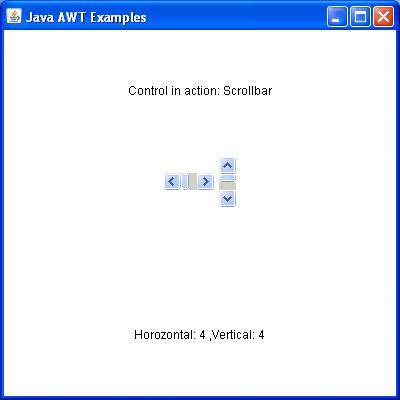
- AWT - Home
- AWT - Overview
- AWT - Environment
- AWT - Controls
- AWT - Event Handling
- AWT - Event Classes
- AWT - Event Listeners
- AWT - Event Adapters
- AWT - Layouts
- AWT - Containers
- AWT - Menu
- AWT - Graphics
AWT - Useful Resources
AWT Scrollbar Class
Introduction
Scrollbar control represents a scroll bar component in order to enable user to select from range of values.
Class declaration
Following is the declaration for java.awt.Scrollbar class:
public class Scrollbar
extends Component
implements Adjustable, Accessible
Field
Following are the fields for java.awt.Image class:
static int HORIZONTAL --A constant that indicates a horizontal scroll bar.
static int VERTICAL --A constant that indicates a vertical scroll bar.
Class constructors
| S.N. | Constructor & Description |
|---|---|
| 1 | Scrollbar() Constructs a new vertical scroll bar. |
| 2 | Scrollbar(int orientation) Constructs a new scroll bar with the specified orientation. |
| 3 | Scrollbar(int orientation, int value, int visible, int minimum, int maximum) Constructs a new scroll bar with the specified orientation, initial value, visible amount, and minimum and maximum values. |
Class methods
| S.N. | Method & Description |
|---|---|
| 1 | void addAdjustmentListener(AdjustmentListener l) Adds the specified adjustment listener to receive instances of AdjustmentEvent from this scroll bar. |
| 2 | void addNotify() Creates the Scrollbar's peer. |
| 3 | int getBlockIncrement() Gets the block increment of this scroll bar. |
| 4 | int getLineIncrement() Deprecated. As of JDK version 1.1, replaced by getUnitIncrement(). |
| 5 | int getMaximum() Gets the maximum value of this scroll bar. |
| 6 | int getMinimum() Gets the minimum value of this scroll bar. |
| 7 | int getOrientation() Returns the orientation of this scroll bar. |
| 8 | int getPageIncrement() Deprecated. As of JDK version 1.1, replaced by getBlockIncrement(). |
| 9 | int getUnitIncrement() Gets the unit increment for this scrollbar. |
| 10 | int getValue() Gets the current value of this scroll bar. |
| 11 | boolean getValueIsAdjusting() Returns true if the value is in the process of changing as a result of actions being taken by the user. |
| 12 | int getVisible() Deprecated. As of JDK version 1.1, replaced by getVisibleAmount(). |
| 13 | int getVisibleAmount() Gets the visible amount of this scroll bar. |
| 14 | protected String paramString() Returns a string representing the state of this Scrollbar. |
| 15 | protected void processAdjustmentEvent(AdjustmentEvent e) Processes adjustment events occurring on this scrollbar by dispatching them to any registered AdjustmentListener objects. |
| 16 | protected void processEvent(AWTEvent e) Processes events on this scroll bar. |
| 17 | void removeAdjustmentListener(AdjustmentListener l) Removes the specified adjustment listener so that it no longer receives instances of AdjustmentEvent from this scroll bar. |
| 18 | void setBlockIncrement(int v) Sets the block increment for this scroll bar. |
| 19 | void setLineIncrement(int v) Deprecated. As of JDK version 1.1, replaced by setUnitIncrement(int). |
| 20 | void setMaximum(int newMaximum) Sets the maximum value of this scroll bar. |
| 21 | void setMinimum(int newMinimum) Sets the minimum value of this scroll bar. |
| 22 | void setOrientation(int orientation) Sets the orientation for this scroll bar. |
| 23 | void setPageIncrement(int v) Deprecated. As of JDK version 1.1, replaced by setBlockIncrement(). |
| 24 | void setUnitIncrement(int v) Sets the unit increment for this scroll bar. |
| 25 | void setValue(int newValue) Sets the value of this scroll bar to the specified value. |
| 26 | void setValueIsAdjusting(boolean b) Sets the valueIsAdjusting property. |
| 27 | void setValues(int value, int visible, int minimum, int maximum) Sets the values of four properties for this scroll bar: value, visibleAmount, minimum, and maximum. |
| 28 | void setVisibleAmount(int newAmount) Sets the visible amount of this scroll bar. |
| 29 | AccessibleContext getAccessibleContext() Gets the AccessibleContext associated with this Scrollbar. |
| 30 | AdjustmentListener[] getAdjustmentListeners() Returns an array of all the adjustment listeners registered on this scrollbar. |
| 31 | <T extends EventListener>T[] getListeners(Class<T> listenerType) Returns an array of all the objects currently registered as FooListeners upon this Scrollbar. |
Methods inherited
This class inherits methods from the following classes:
java.awt.Component
java.lang.Object
Choice Example
Create the following java program using any editor of your choice in say D:/ > AWT > com > tutorialspoint > gui >
AwtControlDemo
package com.tutorialspoint.gui;
import java.awt.*;
import java.awt.event.*;
public class AwtControlDemo {
private Frame mainFrame;
private Label headerLabel;
private Label statusLabel;
private Panel controlPanel;
public AwtControlDemo(){
prepareGUI();
}
public static void main(String[] args){
AwtControlDemo awtControlDemo = new AwtControlDemo();
awtControlDemo.showScrollbarDemo();
}
private void prepareGUI(){
mainFrame = new Frame("Java AWT Examples");
mainFrame.setSize(400,400);
mainFrame.setLayout(new GridLayout(3, 1));
mainFrame.addWindowListener(new WindowAdapter() {
public void windowClosing(WindowEvent windowEvent){
System.exit(0);
}
});
headerLabel = new Label();
headerLabel.setAlignment(Label.CENTER);
statusLabel = new Label();
statusLabel.setAlignment(Label.CENTER);
statusLabel.setSize(350,100);
controlPanel = new Panel();
controlPanel.setLayout(new FlowLayout());
mainFrame.add(headerLabel);
mainFrame.add(controlPanel);
mainFrame.add(statusLabel);
mainFrame.setVisible(true);
}
private void showScrollbarDemo(){
headerLabel.setText("Control in action: Scrollbar");
final Scrollbar horizontalScroller = new Scrollbar(Scrollbar.HORIZONTAL);
final Scrollbar verticalScroller = new Scrollbar();
verticalScroller.setOrientation(Scrollbar.VERTICAL);
horizontalScroller.setMaximum (100);
horizontalScroller.setMinimum (1);
verticalScroller.setMaximum (100);
verticalScroller.setMinimum (1);
horizontalScroller.addAdjustmentListener(new AdjustmentListener() {
@Override
public void adjustmentValueChanged(AdjustmentEvent e) {
statusLabel.setText("Horozontal: "
+horizontalScroller.getValue()
+" ,Vertical: "
+ verticalScroller.getValue());
}
});
verticalScroller.addAdjustmentListener(new AdjustmentListener() {
@Override
public void adjustmentValueChanged(AdjustmentEvent e) {
statusLabel.setText("Horozontal: "
+horizontalScroller.getValue()
+" ,Vertical: "+ verticalScroller.getValue());
}
});
controlPanel.add(horizontalScroller);
controlPanel.add(verticalScroller);
mainFrame.setVisible(true);
}
}
Compile the program using command prompt. Go to D:/ > AWT and type the following command.
D:\AWT>javac com\tutorialspoint\gui\AwtControlDemo.java
If no error comes that means compilation is successful. Run the program using following command.
D:\AWT>java com.tutorialspoint.gui.AwtControlDemo
Verify the following output
